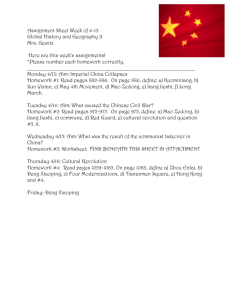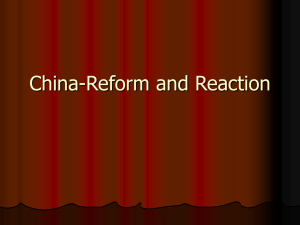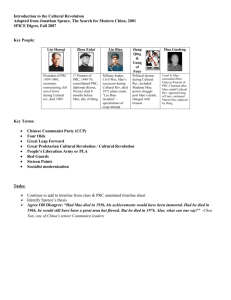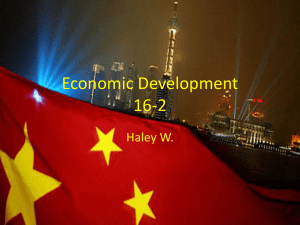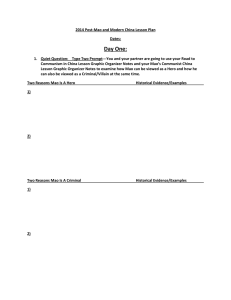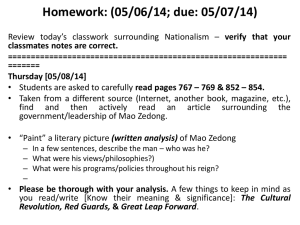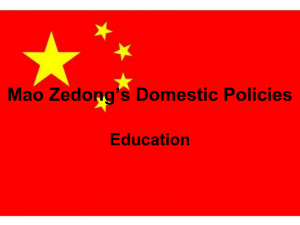Communism in Crisis: PRC
advertisement
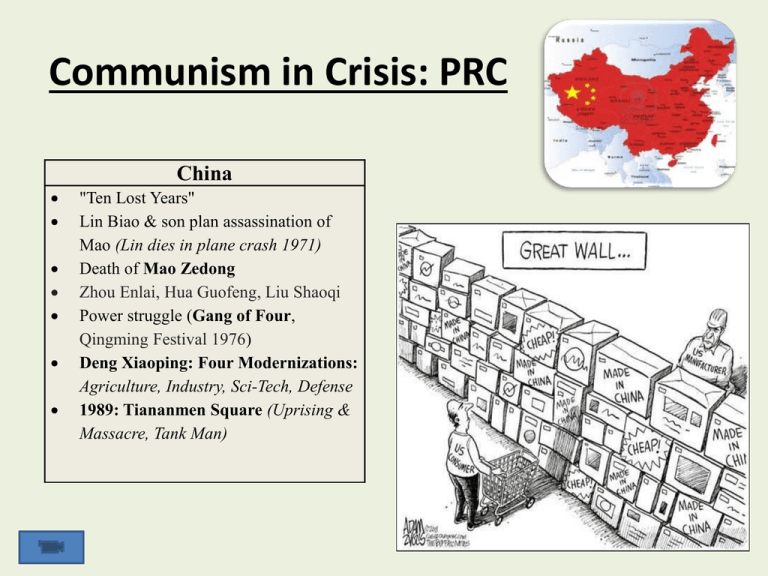
Communism in Crisis: PRC China "Ten Lost Years" Lin Biao & son plan assassination of Mao (Lin dies in plane crash 1971) Death of Mao Zedong Zhou Enlai, Hua Guofeng, Liu Shaoqi Power struggle (Gang of Four, Qingming Festival 1976) Deng Xiaoping: Four Modernizations: Agriculture, Industry, Sci-Tech, Defense 1989: Tiananmen Square (Uprising & Massacre, Tank Man) Mao Review (Paper 2) • Mao & Maoism: • – Ideology – Cult of Personality – Propaganda • Foreign Policies: – WWII – Korean War – Sino-Soviet Split Rise to Power: – Civil War • Vs. Chiang Kai-shek & Nationalists – Long March – Foundation of the PRC: 1949 – Hundred Flowers Campaign • The Red Triangle: – The Party: • Chinese Communist Party (CCP or CPC) – The Army: • People’s Liberation Army (PLA) – The State: • Domestic Policies: – Collectivization of Agriculture & Land Reform – Industrialization – 5 Year Plans – Great Leap Forward (GLF) • Great Leap Backward? – Great Proletarian Cultural Revolution • • • Red Guard Four Olds: thought (or philosophy), culture, customs and habits 10 Lost Years • • President / General Secretary National People’s Council – Administration of party directives Leadership within the PRC: • 1949-1976: Mao was the key power player • After GPCR, Mao took a step back for – Successors.. – Premiers… – Vice Chairmen… • Messy after 1976 • Since 1993: sole candidate for the Presidency = the General Secretary of the Communist Party Chairman of the PRC Chairman of Central Committee / General Secretary of the Central Committee President of PRC (as NPCSC chairman, 1975+) Premiers Chairman of the CPPCC National Committee CPC Central Military Commission 1950s Mao Zedong: 1954-1959 Mao Zedong: 1945-1975 Mao Zedong: 1949-1959 Zhou Enlai: 1954-1976 Mao: 1949-1954 Mao: 1954-1976 1960s Liu Shaoqi: 1959-1968 Mao Zedong: 1945-1975 Liu Shaoqi: 1959-1968 *Ousted Zhou Enlai: 1954-1976 Zhou Enlai: 1954-1976 Mao: 1954-1976 1970s Dong Bwo: 1968-1972 75 Mao Zedong: 1945-1975 • Song Qingling : 1968 1972 (resigned) Hua Guofeng: 1976-1980 1976-78 = Vacant Mao: 1954-1976 (Song Quingling - acting) Hua Guofeng: 1975-1981 Deng Xiaoping: 1978-1983 • Dong Biwu: 1968-1975 • Zhu De: 1975-1976(dies) Deng Yingohao: 1983-1988 • Song Qingling: 1976-78 1980s 1990s 2000s Hu Yaobang: 1981-1982 GS: 1982-1987 Hua Guofeng: 1976-1981 Ye Jianying: 1978-1983 Li Xiannian: 1983-1988 Zhou Ziyang: 19801987 Zhou Ziyang: 1987-1989 Yang Shangkun: 1988-1993 Li Peng: 1987-1998 Zhu Rongji: 19982003 Li Ruihuan: 1993-2003 Jiang Zemin: 1989-2004 Jiang Zemin: 1989-2002 Jiang Zemin: 1993-2003 Hu Jintao: 2002-2012 Hu Jintao: 2003-2012 Wen Jiabao: 20032013 Jia Qinglin: 2003- Hu Jintao: 2004-2012 Xi Jinping: 2012-Present Li Xiannian: 1988-1992 Deng Xiaoping: 1981-1989 1992-93 = Vacant Xi Jinping: 2012- 1960s • Liu Shaoqi = Chairman of PRC, 1959-68 – Mao = still a powerplayer • Central committee • Trouble in Communist Paradise? – Allow peasants to grow on small, individual plots and make local crafts to sell at rural markets • Capitalism??? • Mao countered with: Socialist Education Movement – Placed Liu in charge • Mao gained the support of Lin Biao – Head of PLA • Great Proletarian Cultural Revolution – 10 Lost Years – Counter famines of GLF – Deng Xiaoping – Openly challenged Mao • Lin Biao = named as Mao’s successor… Project 5-7-1 & The Lin Biao Incident • Lin Biao & son Lin Liguo (air force official) • Planned Coup in 1971 • Plot to assassinate Mao • How much did Mao know? – Zhou Enlai was investigating • Attempt to flee to USSR? • Response: – Mao = purged more than 1,000 senior officials at or above the rank of army commander – Power struggle between Zhou Enlai & Gang of Four – Manipulation of Lin Biao’s image / propaganda • Plane Crash in Mongolia – …sure, sure, they ran out of fuel… • Mao’s 1st stroke 1976 • Death of Zhou Enlai – But he was the new designated successor…. Zhou Enlai @ Bandung Conference, 1955 • Qingming festival – Chinese Population = publicly mourns Zhou and supports Deng and indirectly criticize Mao and the Gang of Four – Unexpected – Take down celebration materials (flowers, poems) – Public reaction Open criticism – Military actions – Mao turns on Deng Next? -Deng Xiaoping -Hua Guofeng -Jiang Qing & Gang of Four Vying for Power • Death of Mao: 9/9/1976 • Made Hua Guofang a target – Mao’s heir apparent • Coup = discovered • “Rise of the Gang of Four” – Jiang Qing (1914–91) = Mao’s wife • Ministry of Culture, 1950s • Control of Media • Propaganda during GPCR • Planned coup – Use influence over the media, urban militia and universities – – – – – Arrested Discredited Trials Jail Purge followers • Hua = Chairman – three charges: • to be Mao’s successor • to rehabilitate Deng • to engage in modernization – Deng = in charge of modernization Hua Guafeng: 1976-1981 • Success: Defeating the Gang of Four • Failure: Policy of the Two Whatevers – "We will resolutely uphold whatever policy decisions Chairman Mao made, and unswervingly follow whatever instructions Chairman Mao gave" 1979: Met w/ Thatcher in UK to discuss Hong Kong • Leadership challenge by Deng • 1980: Hua = Ousted – Hua's time in office was "just a transition, not an epoch: his policies were a continuation of the late Mao, and there was nothing original about him“ • Dies in 1981 Deng Xiaoping the Pragmatist • Moderate & Pragmatic – By comparison to Madame Mao (not by western standards) • Victim of GPCR – “Rehabilitated” • Mentor Zhou Enlai • Placed in charge of 10 Year Plan by Hua Guofeng • Outs Hua in 1980 Ten Year Plan • Announced by Hua Guofeng in 1978 • Focused on economic sectors with a heavy industry • Goal = compete with the West – Steel production – Goals for natural resource extractions • Deng = put in charge of political changes • Opening up of China to the West – provided capital • Extensive infrastructure development – Electricity, rail roads, water transport • oil, petroleum, coal and non ferrous-metals… • Too ambitious, too costly • 1979 = goals modified – Focus on the Four Modernizations: • • • • Agriculture Industry science and technology military Four Modernizations • Economic priorities • Established by Zhou Enlai in 1975 • Gain support under Deng in 1978 – New focus: • Not class struggle • Not revolution • Increase internal growth • Export oriented • Improve Sci/Tech • Only by matching the West in terms of economic growth and technological advancement could China hope to emerge as a great power once again • Four Modernizations 1. 2. 3. 4. Defense Agriculture Industry Sci-Tech 1978: Open to foreign investors (the West) 1970s China = still an economically undeveloped Some level of capitalism to help China develop Argued that a true socialist revolution could not occur until a bourgeois revolution had first taken place SEZ: Special Economic Zones: Self-contained, Foreign investment TVE: Town and Village Enterprises Small businesses, entrepreneurial spirit 1978 = 100,000 small businesses 1985 = 17 million 1992 = 20 million TVEs employing 100 million people 1. Excerpt from a speech entitled ‘The present situation and the tasks before us’ given by Deng Xiaoping on 16 January 1980, from Selected Works of Deng Xiaoping (1975–1982), published by Foreign Language Press, Beijing, 1984, p. 236. Deng is speaking at a meeting of cadres called by the Central Committee of the CCP. 2. Excerpt from ‘China’s “Four Modernizations” lead to closer Sino-U.S. science ties,’ by Barbara J. Culliton, Science, New Series, Vol. 201, No. 4355, 11 August 1978, pages 512–13, published by American Association for the Advancement of Science. Culliton is a well-known journalist regarding science topics. The superiority [of the socialist system] should manifest itself in many ways, but first and foremost it must be revealed in the rate of economic growth and economic efficiency. Without political stability and unity, it would be impossible for us to settle down to construction. This has been borne out by our experience in more than twenty years since 1957 … In addition to stability and unity, we must maintain liveliness … when liveliness clashes with stability and unity, we can never pursue the former at the expense of the latter. The experience of the Cultural Revolution has already proved that chaos leads only to retrogression, not to progress. ‘The entire nation is embarking with tremendous enthusiasm on the march towards the modernization of science and technology. Splendid prospects lie before us,’ declared Vice-Premier Teng Hsiao-ping [Deng Xiaoping], who is actively engaged in expanding China’s contacts with foreign nations. On the theory that ‘Backwardness must be perceived before it can be changed,’ Teng spoke bluntly about China’s state of affairs and her new determination to catch up with and even surpass the rest of the world, adhering ‘to the policy of independence and self-reliance.’ Then Teng went on to say, ‘But independence does not mean shutting the door on the world, nor does self-reliance mean blind opposition to everything foreign.’ What can be deduced about Deng Xiaoping’s economic and political outlook? In what ways did Deng Xiaoping wish to transform the PRC? 3. Excerpt from Modern China, third edition, by Edwin E. Moise, published by Longman, UK, 1986, page 231. Moise teaches History of Modern China, Japan and Vietnam at Clemson University in South Carolina, USA. China’s great problem remained its fundamental poverty. Most of the people still lived in poor villages, where they scraped out a living without enough machinery, fertilizer or land. Most villages were still not far above subsistence level; when crops failed through drought or flood, as they did in parts of two provinces in 1980, the peasants went hungry … In an effort to promote agricultural production, the government released many of the restrictions on the ‘spontaneous capitalist tendencies’ of the peasantry. The income of a family came to depend much more on the production of that family, rather than being the family’s share of the production of a larger group. Experiments with the ‘responsibility system’, in which a family or a small group of families was given responsibility for a piece of land or an enterprise owned by their production team, brigade, or commune, occurred quite widely in 1979. Soon afterwards some of the provincial officials who had played a major role in these experiments were promoted to top positions in Beijing; Zhao Ziyang from Sichuan became Premier. What reasons does the author put forward to explain China’s poverty? 4. Excerpt from China and the Crisis of Marxism–Leninism, sixth edition, by Franz Michael, Carl Linden, Jan Prybyla and Jurgen Domes, published by Westview Press, Colorado, USA, 2000, page 65. Michael was a Professor of History at University of Washington and National Chekiang University in Hangchow, China. Linden is a Professor Emeritus of Political Science and International Relations at George Washington University. Prybyla was a Professor of History at Pennsylvania State University. Domes was a Professor of Political Science at the University of Saarland, Germany. [The] idea that 1 acre per family is socialist but 2 acres is capitalist has not been fully exorcised. Since 1980, however, progress has been made on that front. Consolidation of land parcels and their expansion are now permitted, if still carefully watched for possible capitalist abuses. How was capitalism in rural areas defined? 5. Excerpt from The Rise of Modern China, sixth edition, by Immanuel C.Y. Hsu, published by Oxford University Press, UK, 2000, pages 843 and 852. Hsu was a Professor Emeritus of History from the University of California, Santa Barbara, California, USA. On October 1, 1984, on the occasion of the 35th anniversary of the founding of the People’s Republic, he [Deng] confidently announced to the nation that the annual economic growth rates of 7.9 percent during the period 1979–83 and of 14.2 percent in 1984, surpassed the 7.2 percent needed to quadruple the GNP to $1 trillion by the year 2000 … Perhaps the most visible result of the economic reforms was the mushrooming of private businesses and free markets in both rural and urban areas. Private businesses grew in number from 100,000 in 1978 to 5.8 million in 1983 and 17 million by 1985, with some making impressive profits in the capitalist fashion … These free markets and private businesses constituted a lively sector in the vast sea of state-owned enterprises … People complained of inflation, which outpaced both wage increases and cost-of-living adjustments. Inflation was officially put at 4 percent in 1979, 6 percent in 1980, 2.4 percent in 1981 and 1.9 percent in 1982, though the unofficial estimates ranged from 15 to 20 percent or more annually … Confusion, fear and disbelief were prevalent. Having experienced the hardships caused by the hyperinflationary period of 1945–49, the Chinese dreaded any sign of its Recurrence. 6. Excerpt from ‘China’s Special Economic Zones’ by Xu Dixin, Beijing Review, No. 50, published by the China International Publishing Group, 1981. The Beijing Review is a national weekly PRC magazine published in English. Xu is Vice-President of the Chinese Academy of Social Sciences and director of its Institute of Economics. Some people wonder why it is necessary, more than 30 years since the founding of the People’s Republic, to set up special economic zones. They also wonder whether the special zones signify that China is seeking help from capitalist countries. Such concerns are understandable, but unwarranted. Since its establishment, New China has scored brilliant achievements in many fields of work, including economic construction. But it has also traversed a tortuous path. Compared with the world’s most advanced nations, China’s level of production is still rather low. Its funds and technology are incompatible with the requirements of the modernization drive. Furthermore, while implementing its policy of self-reliance in economic construction, China does not exclude co-operation with capitalism. Facts will prove that through developing the economies of the special zones, we will be able to make use of foreign and overseas Chinese capital, as well as state capitalism, to develop China’s socialist economy. Economic construction in the special zones will possibly become a special form of supplement to the development of China’s socialist economy. The total economies of the special zones will only constitute a very small portion of the national economy. Although the socialist economy will continue to dominate, the role of the special zones must not be overlooked. What were the negative economic consequences of the Four Modernizations? What was the purpose of the SEZs? 7. 8. “The Present Situation and the Tasks Before Us” (Speech, January 16, 1980) By Deng Xiaoping First, it is essential to follow a firm and consistent political line. We now have such a line. In his speech at the meeting in celebration of the 30th anniversary of the founding of the People’s Republic, Comrade Ye Jianying formulated the general task — or, if you will, the general line — as follows: Unite the people of all our nationalities and bring all positive forces into play so that we can work with one heart and one mind, go all out, aim high and achieve greater, faster, better, and more economical results in building a modern, powerful socialist country. The socialist system is one thing, and the specific way of building socialism another. This superiority [of the socialist system] should manifest itself in many ways, but first and foremost it must be revealed in the rate of economic growth and in economic efficiency. Without political stability and unity, it would be impossible for us to settle down to construction. This has been borne out by our experience in the more than twenty years since 1957. … In addition to stability and unity, we must maintain liveliness … when liveliness clashes with stability and unity, we can never pursue the former at the expense of the latter. The experience of the Cultural Revolution has already proved that chaos leads only to retrogression, not to progress … Explain the significance of the chart How does Deng Xiaoping understand socialism? (How does Deng’s understanding of socialism contrast with that of Mao?) Tiananmen Square: 1989 • Student Protests & Government Reprisals • "fascists stop killing • “down with the government“ • The greatest challenge to the communist state in China since the 1949 revolution • International outrage H.W. Bush's Secret Letter to Deng • Why is Bush writing the letter (Purpose?) • Fang Lizhi • Why is this a secret letter? • “China’s best-known dissident” lao pengyou = old friend Communism in Crisis: PRC Mao: Paper 2 Review: Paper 2 Questions: • With reference to two examples each chosen from a different region, to what extent do you agree with the claim that ideology was the most important factor in the rise to power of singleparty leaders? • Evaluate the successes and failures one ruler of a single-party state • Compare and contrast the economic and social policies of Mao and Stalin Mao & Maoism: Ideology Cult of Personality Propaganda Rise to Power: Civil War Vs. Chiang Kai-shek & Nationalists Long March Foundation of the PRC: 1949 Hundred Flowers Campaign Domestic Policies: Collectivization of Agriculture & Land Reform Industrialization 5 Year Plans Great Leap Forward (GLF) Great Leap Backward? Great Proletarian Cultural Revolution (GPCR) Red Guard Four Olds: thought (or philosophy), culture, customs and habits 10 Lost Years Foreign Policies: WWII Korean War Sino-Soviet Split The Red Triangle: • The Party: Chinese Communist Party (CCP or CPC) • The Army: People’s Liberation Army (PLA) • The State: President / General Secretary, National People’s Council, Administration of party directives Key Figures: Key Events: Key Vocab: Mao Zedong Liu Shaoqi Lin Biao Zhou Enlai Hua Guofeng Hu Yaobang Jiang Qing Gang of Four Deng Xiaoping WWI, WWII, Chinese Civil War Long March Great Leap Forward & 5 Year Plans Great Proletarian Cultural Revolution Lin Biao Incident Qingming Festival Arrest and Trial of the Gang of Four Two Whatevers Policy Four Modernizations Little Red Book Four Olds GLF, GPCR, 5 year plans Red Guard Pragmatism Four Modernizations Open Door Policy Special Economic Zones Town and Village Enterprises Historiography: • Marxism: 1920s • PRC Institutionalized Party Historiography: Mao-centrism (40s & 50s), Cultural Revolution Propaganda (60s & 70s) Post Cultural Revolution/post-death of Mao • Western Sympathetic: 1937 Red Star over China by an American journalist, Edgar Snow • Revisionism/Post-Revisionism: John King Fairbank and Merle Goldman, Jonathan Spence, Chang and Halliday (critical) Deng Xiaoping the Pragmatist
